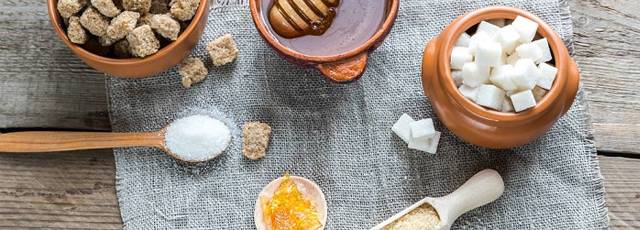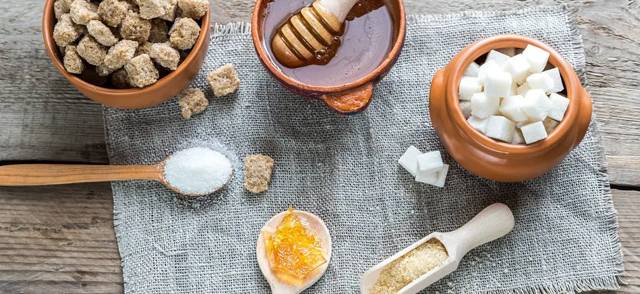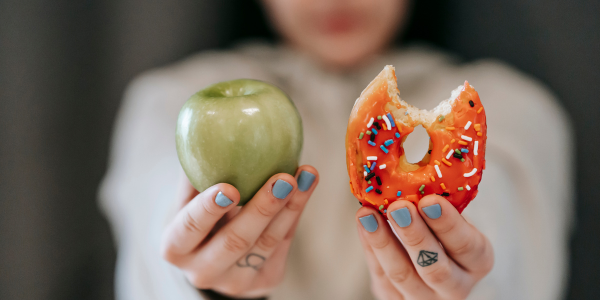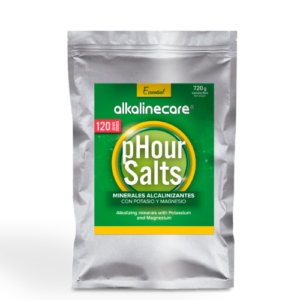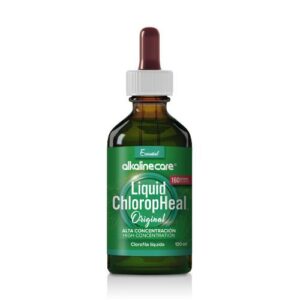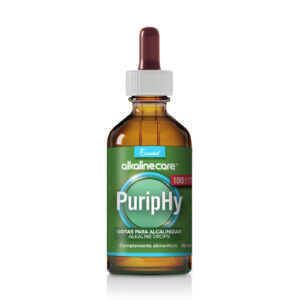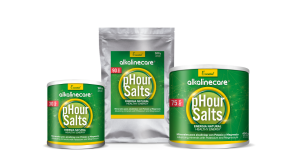In recent years scientists have studied the risks and consequences of the Western diet (high in sugars, added sweeteners and processed sugary foods). Over the last 50 years, sugar consumption has grown exponentially. Today, we’re going to explore healthy sugar substitutes.
Our bodies need a bit of glucose to function. However, there is an excess of sugar and artificial sweeteners in processed foods, such as white sugar, refined White flours, bread, pastries, sauces, desserts, soft drinks, canned foods, candies, etc. These products have significant negative effects on our health.
How Sugar can Affect your Body
- Triggers insulin spikes, contributing to insulin resistance.
- Promotes high blood pressure, diabetes, and elevated triglycerides.
- Causes cellular aging and produces molecules called AGEs, which damage collagen and elastin, leading to wrinkles, acne and skin problems.
- Encourages obesity and weight gain by blocking the effects of leptin and ghrelin, hormones that regulate appetite, which can lead to resistance to both.
- Leads to dental issues such as cavities and promotes bacterial growth that affects the gums.
- Increases the risk of cardiovascular diseases, particularly affecting children’s arteries.
- Causes anxiety due to its addictive excitotoxin effect, initially stimulating the central nervous system, followed by a sudden “crash,” often accompanied by massive neuron death (Dr. Russell L. Blaylock, M.D., *Excitotoxins, The Taste That Kills*).
- Lowers concentration and mental focus, negatively affecting memory. It can also cause irritability and mood swings.
- Causes inflammation in the body and brain, increasing the risk of certain liver conditions like fatty liver disease.
- Plays a role in many degenerative and neurodegenerative diseases, including malignant tumors and Alzheimer’s.
In short, it’s best to limit sugar and processed foods as much as possible.
Erythritol and Xylitol: Gastrointestinal Issues
- These two sweeteners have become popular but can have drawbacks. Erythritol, a natural polyol alcohol, is typically derived from fermenting corn or wheat starch. It has a low glycemic index and doesn’t spike blood sugar, making it popular amongst diabetics and keto dieters. However, it can cause digestive issues like gas and bloating as it may alter gut flora. Thus, it may not be ideal for people with gastrointestinal issues, such as irritable bowel syndrome, malabsorption, or fructose intolerance.
- Xylitol, known as birch sugar, is also a sugar-free sweetener with antibacterial properties and immune support. However, it should be consumed in moderation as it can cause diarrhea and digestive issues due to its effects on gut flora.

Healthy Sugar Substitutes
Organic Raw Honey
Rich in nutrients and antioxidants, raw honey provides minerals and vitamins. It improves triglycerides, LDL cholesterol, and blood pressure, while supporting immunity and gut health. It’s best enjoyed in moderation and can be taken with tea and coffee, desserts and homemade breakfasts. Ideal for the whole family.
Maple Syrup
Originated in Quebec, Canada, it’s a completely natural product with a normal glycemic index, antioxidants and minerals like calcium. It also has anti-inflammatory properties, making it great for homemade desserts, cookies, and cakes, while respecting gut health.
Stevia Leaves
This zero-calorie, low glycemic plant is suitable for diabetics, those aiming to lose weight or keto dieters. Stevia is a highly effective sweetener with antibacterial, vasodilatory, diuretic, and immune-modulating properties, supporting gut health.
Raw Cane Sugar
Derived directly from unrefined sugar cane, it is natural and suitable for the whole family. Rich in vitamins B, A, C, D, and E, and minerals like zinc, magnesium, calcium, manganese, and phosphorus, it supports bones and teeth and is gentle on the gut.
Homemade Date Syrup
Easy to make: soak 5 or 6 dates (preferably Medjool) in water for a few hours, then remove the pits and blend with water until smooth. You can adjust the thickness by adding more water. This syrup provides a soft sweetness and is rich in potassium, iron, and magnesium, making it a great fiber and energy source. It’s ideal for kids, athletes, and the whole family while respecting gut health.
Coconut Sugar
This natural delight has a relatively low glycemic index. Extracted from the coconut palm’s flower nectar, it contains 16 of the 20 amino acids, especially glutamine, which helps repair the intestinal mucosa. It’s rich in vitamins B1, B2, B3, B6, and C, as well as minerals like potassium, magnesium, zinc, and iron. It’s great for baking and breakfasts while supporting gut health.
As you can see, there are a lot of healthy options to suit your needs, but even though they should be consumed in moderation.
Extra Virgin Coconut Oil
Lastly, here’s a tip to add a hint of sweetness to your morning coffee or tea—just add a teaspoon of extra virgin coconut oil. Did you know caffeine crosses the blood-brain barrier, making it an excellent carrier? When combined with medium-chain triglycerides as in coconut oil, caffeine is better absorbed, benefiting the body and brain. You’ll notice improved energy, concentration, and reduced sugar cravings. Perfect for keto diets and to curb sweet cravings.
Give it a try!
